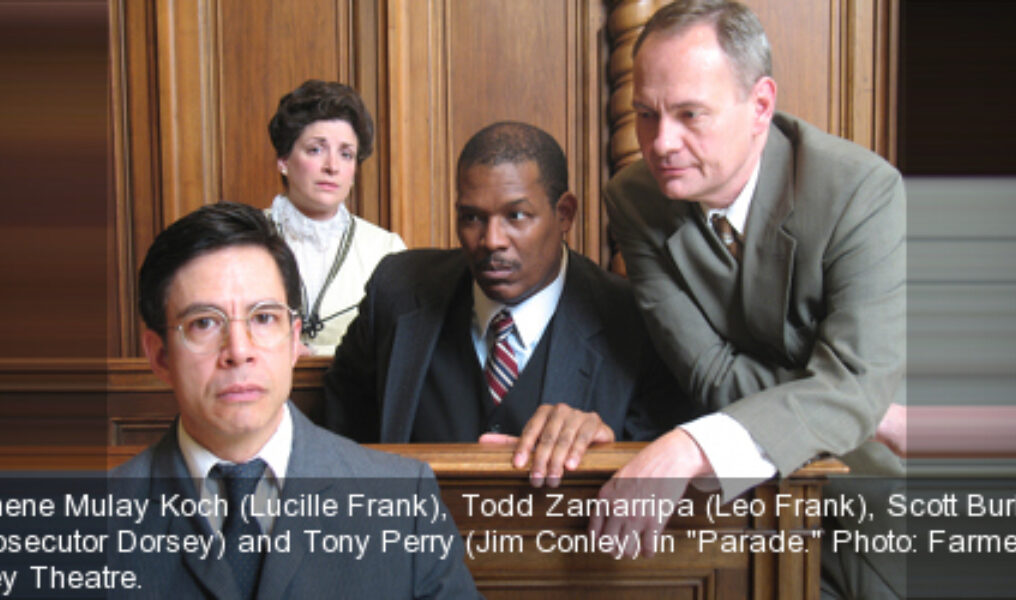By Bridgette M. Redman

Farmers Alley Theatre's production of "Parade" is proof positive you don't need a big space to do a big musical. The two-year-old group has attracted Broadway professionals to their intimate space and, together with their artistically high production values, has staged a musical that rivals any touring show.
"Parade" is a powerful musical that retells historic events. Alfred Uhry, playwright of several works about Jews in the South, pulls in dialogue from court transcripts and newspaper reports on the trial of Leo Frank, a Jewish pencil factory superintendent where a 14-year-old girl was raped and murdered in 1913 on Confederate Memorial Day. While all the evidence was circumstantial, there was great political pressure to indict someone and the Yankee outsider from Brooklyn seemed a perfect choice.
Director Kathy Mulay and scenic designer W. Douglas Blickle set the stage immediately with a set that stretches out to the entry door and beautifully painted murals that evoke the time period. There is haze in the air, produced with water rather than smoke to summon up the humid days of Atlanta where the play takes place.
Todd Zamarripa, a Michigan native with an impressive Broadway resume (including part of the original Broadway cast of "Miss Saigon") nails the part of Leo Frank, an irascible New Yorker who knows he is out of place in the good ol' boy atmosphere of Atlanta. He inhabits the role convincingly, telling the story with every movement, expression, inflection and word.
While Uhrey's musical does treat on prejudice, hatred and the unthinking behavior of mobs, it is primarily the story of Leo and Lucille Frank. While they have already been married for several years, they have a coldness about their relationship — not the resentment of enemies, but the stiffness of strangers. Both are fulfilling their duties and wanting to do right by each other, but not yet knowing each other. Through the course of the musical, we watch as their relationship flourishes. Lucille (played by Denene Mulay Koch) transforms in Leo's perception from the wife that he must provide for to a true partner. Their love scene is touching not because of its passion, but because of their transformation.
All but three of the 17 actors play multiple roles, with Tony Perry performing most impressively as Jim Conley, the factory janitor and an ex-convict, along with the parts of the governor's household staff and the night watchman who reported the crime. So different were his characters that it was hard to believe that they were played by the same actor. Jim Conley, whom the district attorney coached to testify against Leo Franke because "hanging a Negro isn't going to be enough this time," makes a fantastic transition from the frightened suspect to the confident witness to the bitter and loud man serving out the terms of his deal.
Perry has a voice that fills the entire performance space with a clear strength that grips its listeners. The only reason he cannot be said to have carried the show is because all of the other performers were equally strong. Especially inventive is the choreography that has Perry and Alfrelynn J. Roberts making set changes while singing "A Rumblin' and a Rollin'," a song indicting the Northerners for objecting to Frank's sentence while they are silent at the injustices done upon Negros.
Every number in the musical is beautifully sung and there is not a weak voice in the entire ensemble.
Kathryn S. Williams' choreography was as intense as the topic and except for a few moments where overly affected movements detracted from the emotional intensity, it was perfectly executed. In the final scene of Act I, there is a sense of horror communicated solely by the choreography and the facial expressions of the performers.
Actresses Katrina Van Maanan, Mary Teutsch, and Anica DeGraff as the trio of factory girls could have been picked up and with a minor change of costume been dropped into "The Crucible" and not had to change their performance at all. Caught up in hate and prejudice, they seemed almost bewitched in the way they made their accusations.
Prosecutor Hugh Dorsey, played by Augusta Barn favorite and Broadway veteran Scott Burkell, schemes for political purposes, coming across as evil in his disregard for anything but his own self-interest. He's willing to send an innocent to his death or whip up a mob if it will get him where he wants — the governor's seat.
Jason Roberts Brown's lyrics and music turn Uhry's story into a civil rights masterpiece that swings easily between subtlety, cynicism, tenderness and rage. There are numbers that seem to pay tribute to "Chicago," "Brother Where Art Thou" or any number of Sondheim musicals.
The orchestra, which was placed behind the screen on which projections were made to indicate scene changes, performed the complicated music beautifully, never overpowering the singers and adding texture and mood to each scene. While Lanford Potts' lighting design was complex and often beautiful, there were a few times when it drew focus, making the audience think about the lighting rather than what was happening in the story.
Likewise, the projections created by Kathy Mulay and Greg Laux were almost too distracting. While they were beautiful and appropriate, it tended to draw focus away from the very powerful action taking place on stage.
The Farmers Alley production is ultimately breathtaking and as powerfully presented as its creators could ever hope for. Take the trip to Kalamazoo. You won't be disappointed in this polished performance that asks serious questions about the price we pay for mixing hatred and politics.
REVIEW:
'Parade'
Farmers Alley Theatre, 221 Farmers Alley, Kalamazoo. Thursday-Sunday through June 27. $25. 269-343-2727. http://www.farmersalleytheatre.com










